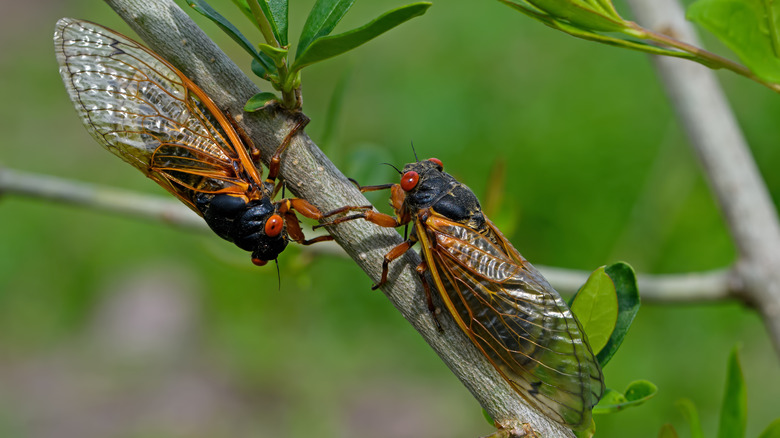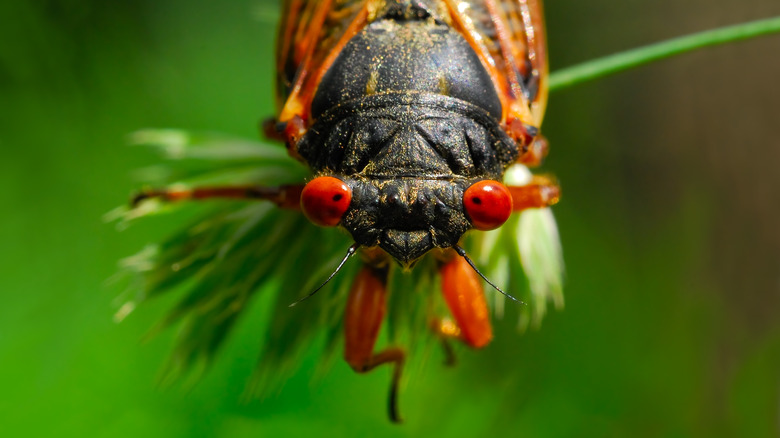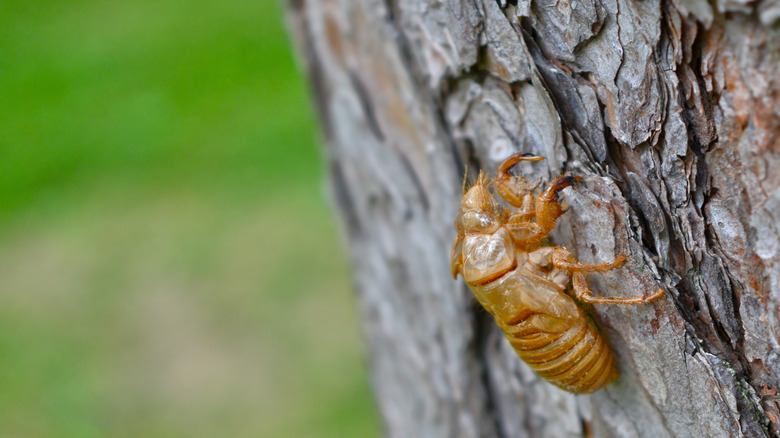2024 Will Be The Year Of The Cicada. Here's How To Get Ready
When it comes to cicadas, there are two types of people: those who enjoy them and others who want to keep them out of their yards. If you are in the second group, we have some bad news. Depending on where you live, this year you'll not only have to endure the normal influx of these large insects, but their numbers will be significantly increased due to an event that has not happened in over 200 years. Two broods will hatch this summer, overlapping in a few states with the annual cicadas, providing some with a double batch.
There are two kinds of cicadas in the US. Annual cicadas emerge from the ground every year to breed while singing their breeding song after the soil warms up. The influx some areas will experience this year is a result of periodical types which are referred to as "broods," a term that is defined as "all periodical cicadas of the same life cycle type that emerge in a given year" according to the University of Connecticut. Brood XIX emerges every 13 years while Brood XIII emerges every 17 years. In 2024, the emergence of both of these broods will overlap with annual cicadas.
Who will be affected
The vast majority of the US will not experience this phenomenon in its entirety. Brood XIX will affect 14 states in the Midwest and Southeast regions. As the soil warms and cicadas leave their winter homes, they emerge around mid-May in the following states: Alabama, Arkansas, Georgia, Illinois, Indiana, Kentucky, Louisiana, Mississippi, Missouri, North Carolina, Oklahoma, South Carolina, Tennessee, and Virginia. If you live in one of these states, you will experience Brood XIX in addition to annual cicadas.
Brood XIII will only affect four or five states, starting in mid-May: Illinois, Indiana, Iowa, Wisconsin, and possibly Michigan. Those living in these states will also get to enjoy –- or not -– the sound of a double dose of cicadas this summer with Brood XIII and annual types.
You might notice there is an overlap in two of these states: Illinois and Indiana. Folks in these regions will experience the brunt of the cicada-pocalypse. While most regions in the central and southeastern U.S. will have more cicadas than normal, these two states and some surrounding areas may find themselves utterly overwhelmed with billions of singing cicadas.
How to prepare
If you are in the anti-cicada camp and live in one of the affected areas, it might help to know that their breeding season (the noisy part) is fairly short at about 6 weeks between May and June. During this time you might want to invest in some earplugs if their screeching keeps you awake at night. Unfortunately, these broods are louder than their annual counterparts in part because there are so many of them all at once. This screeching helps males attract female mates. If you are in the double brood region, it will be loud. This won't happen again until 2245, so you won't have to worry about it beyond this year.
The good news about this double brood emergence is that cicadas are not considered harmful to gardens, people, or pets. In fact, these large insects have some benefits. They are a meaty, tree-dwelling food source for birds, so your reward for tolerating the noise may be an increase in the types of feathered friends you see. Since cicadas are large insects that overwinter in the soil, they also offer natural lawn aeration which allows water and nutrients to reach grass roots. As for all those exoskeletons left behind, you can just knock them onto the ground, where they will decompose and feed the soil.


